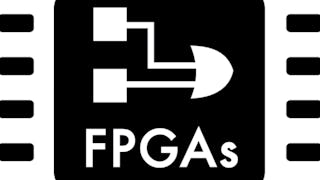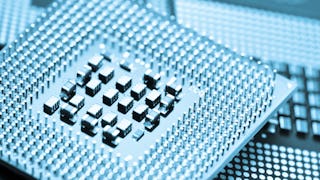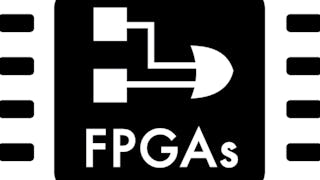This course will introduce you to all aspects of development of Soft Processors and Intellectual Property (IP) in FPGA design. You will learn the extent of Soft Processor types and capabilities, how to make your own Soft Processor in and FPGA, including how to design the hardware and the software for a Soft Processor. You will learn how to add IP blocks and custom instructions to your Soft Processor. After the Soft Processor is made, you learn how to verify the design using simulation and an internal logic analyzer. Once complete you will know how to create and use Soft Processors and IP, a very useful skill.

Enjoy unlimited growth with a year of Coursera Plus for $199 (regularly $399). Save now.

FPGA Softcore Processors and IP Acquisition
This course is part of FPGA Design for Embedded Systems Specialization

Instructor: Timothy Scherr
9,134 already enrolled
Included with
(97 reviews)
Recommended experience
What you'll learn
Skills you'll gain
Details to know

Add to your LinkedIn profile
4 assignments
See how employees at top companies are mastering in-demand skills

Build your subject-matter expertise
- Learn new concepts from industry experts
- Gain a foundational understanding of a subject or tool
- Develop job-relevant skills with hands-on projects
- Earn a shareable career certificate

There are 4 modules in this course
This module introduces the concept of a soft processor in general, and of hardware design for the soft processor in particular. It presents an overview of soft processors, describing all the different kinds that are available from Xilinx, Altera, Microsemi, and Lattice and then goes into depth about the Nios II soft processor from Altera. The benefits of using soft processors to prevent obsolescence and provide flexibility are explained. The content guides you through a hardware design of the Nios II processor using Qsys, the Altera system design tool. Lastly, design of a custom instruction in the Nios II is presented, showing the versatility of the soft processor in an FPGA.
What's included
11 videos2 readings1 assignment1 discussion prompt
This module delves further into the development of soft processors, It describes the soft processor development flow in more detail, including the tools needed to develop software for the soft processor. It then introduces the Eclipse-based IDE for Nios II software development, and then shows how the output of the Qsys design is used to establish a Board Support Package (BSP) for the processor, which is necessary because the processor hardware design can be changed and the BSP software library must support any changes. Use of the BSP editor to configure the processor by programming control registers is demonstrated. Finally, the use of the custom instruction developed in Module 1 is presented, including the use of software macros to complete the implementation of the custom instruction.
What's included
8 videos1 reading1 assignment
Modern FPGA design is no longer centered on HDL module design as it is on acquisition and use of IP Cores. In this Module we will introduce IP cores including offerings from all the major vendors, Intel Altera, Xilinx, Microchip Microsemi, and Lattice. You will learn how to find, acquire, and use these cores.
What's included
6 videos1 reading1 assignment
As we work on more complex FPGA designs, the challenges to create an error-free design mount exponentially. Having a good grasp of the tools needed to verify correctness of design has become more and more important. After introducing simulation in previous sessions, in this module we will examine simulation with ModelSim in more depth by working through some examples. This will show the utility of simulation for verification and debugging. This module will also describe in some detail how the simulator works and how it achieves concurrency through the use of delta delays. As a final step in the debugging process, the internal logic analyzer SignalTap II is introduced.
What's included
8 videos1 reading1 assignment
Earn a career certificate
Add this credential to your LinkedIn profile, resume, or CV. Share it on social media and in your performance review.
Build toward a degree
This course is part of the following degree program(s) offered by University of Colorado Boulder. If you are admitted and enroll, your completed coursework may count toward your degree learning and your progress can transfer with you.¹
Instructor

Offered by
Explore more from Electrical Engineering
 Status: Free Trial
Status: Free TrialUniversity of Colorado Boulder
 Status: Free Trial
Status: Free TrialUniversity of Colorado Boulder

Politecnico di Milano
 Status: Free Trial
Status: Free TrialUniversity of Colorado Boulder
Why people choose Coursera for their career




Learner reviews
97 reviews
- 5 stars
47.42%
- 4 stars
18.55%
- 3 stars
20.61%
- 2 stars
6.18%
- 1 star
7.21%
Showing 3 of 97
Reviewed on Aug 11, 2021
I was hoping to get more lecture material on writing testbench code.
Reviewed on Oct 18, 2022
the course is structured properly as practical demo has been given with theoretical concepts.
Reviewed on Jul 31, 2023
Very interesting for demonstration purposes. There is much to be learned by working on your own afterwards with the notes taken.
Frequently asked questions
To access the course materials, assignments and to earn a Certificate, you will need to purchase the Certificate experience when you enroll in a course. You can try a Free Trial instead, or apply for Financial Aid. The course may offer 'Full Course, No Certificate' instead. This option lets you see all course materials, submit required assessments, and get a final grade. This also means that you will not be able to purchase a Certificate experience.
When you enroll in the course, you get access to all of the courses in the Specialization, and you earn a certificate when you complete the work. Your electronic Certificate will be added to your Accomplishments page - from there, you can print your Certificate or add it to your LinkedIn profile.
Yes. In select learning programs, you can apply for financial aid or a scholarship if you can’t afford the enrollment fee. If fin aid or scholarship is available for your learning program selection, you’ll find a link to apply on the description page.
More questions
Financial aid available,





